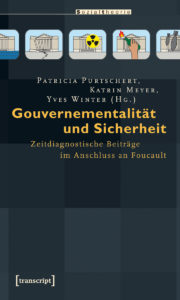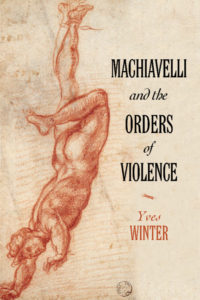 September 18, 2018: My book, Machiavelli and the Orders of Violence, is out! It is available in hardback, paperback, and as an ebook from Cambridge University Press.
September 18, 2018: My book, Machiavelli and the Orders of Violence, is out! It is available in hardback, paperback, and as an ebook from Cambridge University Press.
Our co-edited volume on governmentality and security, Gouvernementalität und Sicherheit (Transcript Verlag, 2008) is now available in open-access.
 June 29, 2016: My article The Siege of Gaza: Spatial Violence, Humanitarian Strategies, and the Biopolitics of Punishment [behind paywall] is now available from Constellations.
June 29, 2016: My article The Siege of Gaza: Spatial Violence, Humanitarian Strategies, and the Biopolitics of Punishment [behind paywall] is now available from Constellations.
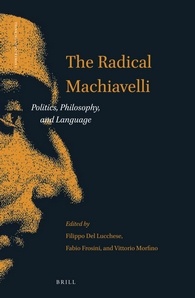 September 23, 2015: Just out! The Radical Machiavelli: Politics, Philosophy, and Language, edited by Fillipo del Lucchese, Fabio Frosini, and Vittorio Morfino. Leiden, Netherlands: Brill, 2015.
September 23, 2015: Just out! The Radical Machiavelli: Politics, Philosophy, and Language, edited by Fillipo del Lucchese, Fabio Frosini, and Vittorio Morfino. Leiden, Netherlands: Brill, 2015.
So very pleased to be part of this volume, which grew out of a fabulous conference in London, two years ago. Here’s an excerpt from the blurb:
“Rather than a neutral, comprehensive, and safe interpretation, this book offers a partial and even partisan reading of Machiavelli […]”
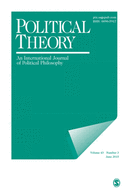 June 1, 2015: Shipwrecked Sovereignty! Joshua Chambers-Letson and I have a co-authored article in the current issue of Political Theory. The piece is about a legal and political controversy concerning a Napoleonic shipwreck that was recently salvaged off the Iberian peninsula by a private corporation. On board of the Spanish warship was the most valuable treasure ever recovered from a shipwreck—a loot of gold and silver mined and minted in the colonial Viceroyalty of Peru, valued at approximately half a billion US Dollars. The legal controversy that ensued pitted the corporate salvors against Spain and Peru, each side drawing on different logics to make their case. Our essay—“Shipwrecked Sovereignty: Neoliberalism and a Disputed Sunken Treasure”— discusses the political and theoretical dimensions of the dispute.
June 1, 2015: Shipwrecked Sovereignty! Joshua Chambers-Letson and I have a co-authored article in the current issue of Political Theory. The piece is about a legal and political controversy concerning a Napoleonic shipwreck that was recently salvaged off the Iberian peninsula by a private corporation. On board of the Spanish warship was the most valuable treasure ever recovered from a shipwreck—a loot of gold and silver mined and minted in the colonial Viceroyalty of Peru, valued at approximately half a billion US Dollars. The legal controversy that ensued pitted the corporate salvors against Spain and Peru, each side drawing on different logics to make their case. Our essay—“Shipwrecked Sovereignty: Neoliberalism and a Disputed Sunken Treasure”— discusses the political and theoretical dimensions of the dispute.
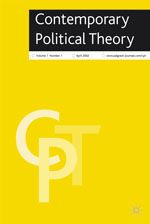 October 15, 2014: My article Debating Violence on a Desert Island: Engels, Dühring and Robinson Crusoe [behind paywall] is now officially out in Contemporary Political Theory. Here is the abstract:
October 15, 2014: My article Debating Violence on a Desert Island: Engels, Dühring and Robinson Crusoe [behind paywall] is now officially out in Contemporary Political Theory. Here is the abstract:
Ever since the publication in 1719 of Daniel Defoe’s Robinson Crusoe, the novel’s eponymous protagonist has had a pervasive presence in the modern social and cultural imaginary, giving rise to an entire literary genre known as Robinsonades. In Anti-Dühring (1877), Friedrich Engels identifies such a Robinsonade in the work of Eugen von Dühring, the target of his polemic, and draws on it for a critique of ahistorical theories of violence. The particular version of the Robinsonade Engels ascribes to Dühring is fabricated, yet a close examination of this fabrication suggests that it serves important analytic and interpretive purposes. Ironically, Engels’s critique of Robinsonades is so compelling that it ends up undermining his own tendency to economic and technological reductionism. Despite Engels’s attempts to distance himself from the Robinsonade he projects onto Dühring, the Crusoe story acts as a fraught supplement to his own theory of violence. In particular, it reveals the tensions in his work between, on the one hand, economic and technological reductionism, and on the other hand, attention to social, cultural and symbolic forces without which no plausible history of violence can be written.
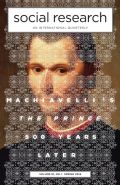 April 30, 2014: The most recent issue of Social Research: An International Quarterly marks the five hundredth anniversary of Machiavelli’s The Prince. Contributors include John McCormick (issue editor), Mark Jurdjevic, Jacob Soll, Erica Benner, Catherine Zuckert, Jo Ann Cavallo, Nathan Tarcov, Miguel Vatter, Jan-Werner Müller. My article is on The Prince and His Art of War: Machiavelli’s Military Populism.
April 30, 2014: The most recent issue of Social Research: An International Quarterly marks the five hundredth anniversary of Machiavelli’s The Prince. Contributors include John McCormick (issue editor), Mark Jurdjevic, Jacob Soll, Erica Benner, Catherine Zuckert, Jo Ann Cavallo, Nathan Tarcov, Miguel Vatter, Jan-Werner Müller. My article is on The Prince and His Art of War: Machiavelli’s Military Populism.
 September 10, 2013: My article Debating Violence on a Desert Island: Engels, Dühring and Robinson Crusoe [behind paywall] has been published by Contemporary Political Theory. While it is not yet out in print, it is available online as part of CPT’s Advance Online Publication. The article is about Friedrich Engels’s theory of violence and the use of Robinson Crusoe as a figure in Engels’s conceptualization of violence and in his critique of Eugen Dühring.
September 10, 2013: My article Debating Violence on a Desert Island: Engels, Dühring and Robinson Crusoe [behind paywall] has been published by Contemporary Political Theory. While it is not yet out in print, it is available online as part of CPT’s Advance Online Publication. The article is about Friedrich Engels’s theory of violence and the use of Robinson Crusoe as a figure in Engels’s conceptualization of violence and in his critique of Eugen Dühring.
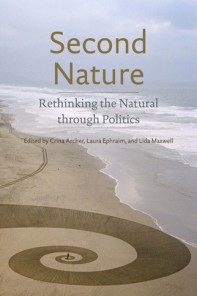 August 13, 2013: Just out from Fordham University Press: Second Nature: Rethinking the Natural through Politics, a new volume edited by Crina Archer, Laura Ephraim, and Lida Maxwell. I have an essay in the book titled “Necessity and Fortune: Machiavelli’s Politics of Nature”.
August 13, 2013: Just out from Fordham University Press: Second Nature: Rethinking the Natural through Politics, a new volume edited by Crina Archer, Laura Ephraim, and Lida Maxwell. I have an essay in the book titled “Necessity and Fortune: Machiavelli’s Politics of Nature”.
![]() December 4, 2012: Exciting news! As of the August 2013, I will be joining the McGill Department of Political Science as an Assistant Professor. I’ll be affiliated with two great research groups, the Research Group on Constitutional Studies and the inter-university Groupe de recherche interuniversitaire en philosophie politique (GRIPP). I look forward to becoming a permanent member of this community.
December 4, 2012: Exciting news! As of the August 2013, I will be joining the McGill Department of Political Science as an Assistant Professor. I’ll be affiliated with two great research groups, the Research Group on Constitutional Studies and the inter-university Groupe de recherche interuniversitaire en philosophie politique (GRIPP). I look forward to becoming a permanent member of this community.
